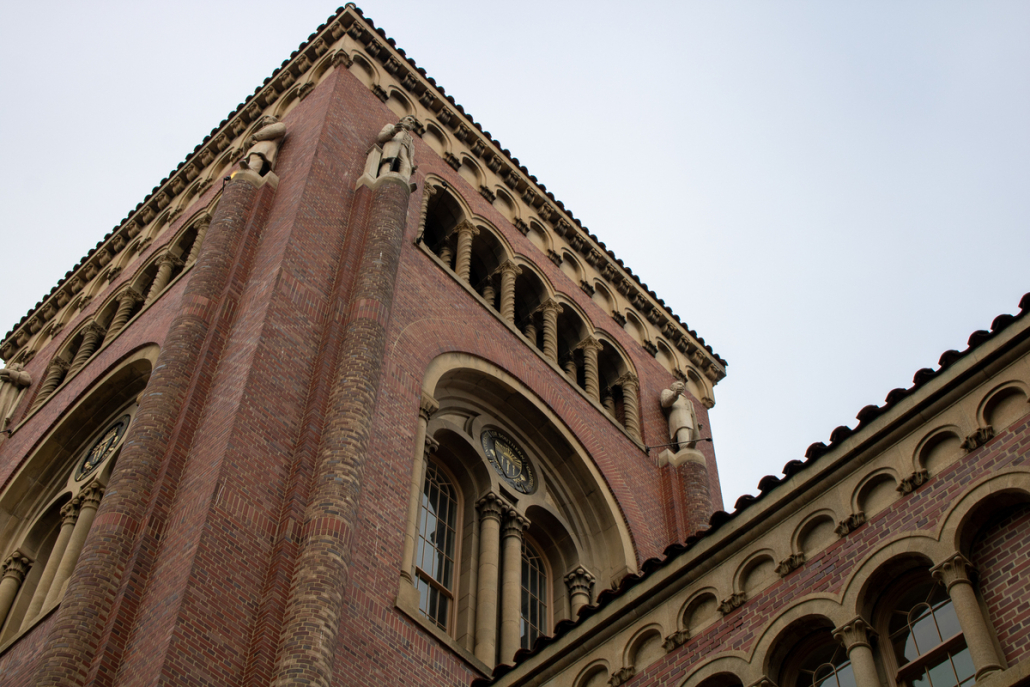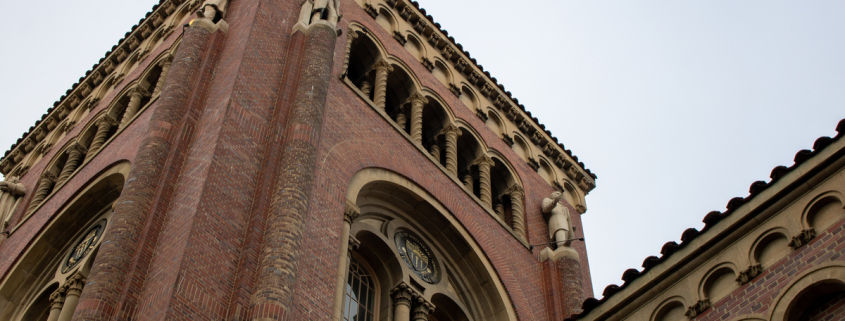Tweets, letters stir anger

Content warning: This article contains strong language.
USC will establish an Advisory Committee of Jewish Life and ensure Jewish representation in the University’s Diversity, Equity and Inclusion efforts, President Carol Folt announced in a Jan. 13 email to the “USC Jewish community and supporters.”
The announcement follows months of faculty open letters, accusations of antisemitism and “racial & ethnic harassment” toward a Palestinian student that highlights persistent conflict on college campuses across the country, including navigating free speech issues, protecting students with various identities and disputes surrounding Israel and Palestine.
At USC, the most recent controversy stems from civil engineering major Yasmeen Mashayekh’s tweets last spring and summer that included statements such as “I want to kill every motherfucking Zionist,” “I fucking love hamas” and “yel3an el yahood,” — which directly translates to “curse the Jews” — though Mashayekh later on Twitter said she referred to the “apartheid regime” and that yel3an means a “request for God to cast judgment,” rather than “curse.”
Mashayekh deleted the tweets before the beginning of the fall semester, but they came onto professors’ radars in late November after outside organizations, such as Canary Mission, shared screenshots. At that time, the University had not yet publicly addressed the tweets.
More than 60 faculty members signed an open letter Dec. 1 addressed to Folt, Provost and Senior Vice President for Academic Affairs Charles Zukoski and Board of Trustees Chairman Rick Caruso, demanding the University “publicly and explicitly rebuke” Mashayekh’s tweets and writing that unrebuked expressions of antisemitism and zionophobia on campus are “alienating, hurtful, and depressing.”
Mashayekh and online supporters circulated a letter addressed to Folt and Viterbi School of Engineering Dean Yannis Yortsos on Dec. 2, writing that “the language of the oppressed towards their oppressor is a form of personal resistance” against “colonial violence,” and urging the University to “stand in support of an oppressed student.”
In a Dec. 3 response to the faculty open letter, Folt and Zukoski wrote that the University discovered Mashayekh’s tweets over the summer and subsequently removed her from a Viterbi paid mentoring position. They also wrote that Mashayekh is not a “Diversity, Equity and Inclusion Senator” as the faculty letter suggests, and that she is instead a DEI Senator of the Viterbi Graduate Student Association, a student elected position.
Since Dec. 3, University officials — from Folt and Zukoski to Caruso — have released a total of eight statements condemning antisemitism on campus located on the “We are SC” website under a new tab published Dec. 31 titled “Addressing Antisemitism.” The first four messages respond to the Dec. 1 letter, the next two address USC’s inclusion in the Simon Wiesenthal Center’s “Anti-Semitic 2021 Top Ten List” and the last two discuss the University’s new initiatives dedicated to combating antisemitism.
Critical of the University’s response, lack of support
In an interview with the Daily Trojan Jan. 6, Folt said the University is dedicated to supporting the campus’ Jewish community, citing the new Jewish Life advisory committee and conversations with USC Hillel. She also said that many of the demands she’s received about social media posts have come from outside sources who “don’t really know what it’s like on our campus,” rather than students.
Mashayekh wrote on Twitter that she and her family have received death threats as a result of online harassment, as well as an FBI visit.
“Today my mom received a phone call from someone threatening to kill me, her and my entire family because of my tweets; the person claimed to know where I live. I do not feel safe on campus. This school has done nothing but cater to my oppressor,” wrote Mashayekh in a Dec. 14 Tweet.
Mashayekh did not respond to multiple interview requests from the Daily Trojan.
Emad Askar, who graduated from USC in 2021 and is a past member of Students for Justice in Palestine, said the University has not properly supported Palestinian students, nor allowed for their recognition on campus. To Askar, it is “preposterous” that a girl tweeting “I want to kill Zionists” is inappropriate.
“You have every right as an oppressed group to violently rebel against your oppressor,” Askar said.
To the professors who penned the letter, the initial University response to Mashayekh’s tweets did not move beyond empty statements and platitudes, failing to address “hate speech” that they said makes some Jewish students feel unsafe on campus.
“You address hate speech with a speech that debunks it, that tells that ‘No, we don’t want to kill all Zionist students,’ and Zionist students are welcome on campus,” said Hanna Reisler, a chemistry professor. “We didn’t hear it. That has not been yet articulated.”
In an email to the Daily Trojan, Reisler wrote that she will now serve on the new advisory committee of Jewish Life.
Jacob Miller, a senior majoring in biochemistry and co-president of USC Hillel, said that, while he generally feels supported as a Jewish student on campus, he’s experienced “microaggressions” in classrooms and that “current instances on social media” made him feel unsafe on campus.
“I think when these things happen, it’s really hurtful as a Jewish student, and, oftentimes, students feel unsafe on campus,” Miller said.
Addressing concerns about the University’s inadequate support of Palestinian students, Folt said “it’s a real problem if we try to put those in opposition.”
“I think someone can be very strongly wanting to have non-antisemitic behavior and very strongly not wanting Islamophobic behavior, and I absolutely believe most people are there,” Folt said. “We don’t want to be a part of a narrative that creates those as opposition.”
Askar, though, said that framing the issue as a “conflict” falsely implies that Zionist students equally struggle on campus when they have the “overwhelming support of the school [and] of the United States.”
While a student at USC, Askar said he unsuccessfully petitioned to hang a Palestinian flag outside the Dr. Joseph Medicine Crow Center for International and Public Affairs, which, to him, showed the lack of recognition Palestinian students receive from USC administration.
“[University administration] will cut off any progress by not even letting there be the representation of putting a piece of cloth on a building that people, half the time, don’t even look up and notice,” Askar said. “But it means that much to us because we’ve gotten so little in our life.”
Not an isolated incident
The University has dealt with controversy surrounding Israel and Palestine before the outcry that followed Mashayekh’s tweets. Last May, the Gender Studies Department endorsed a statement on Solidarity with Palestinian Feminist Collective calling for “feminists everywhere to speak up, organize, and join the struggle for Palestinian liberation.”
On Aug. 8, a similar group of professors published an open letter to Folt, Caruso and Zukoski that expressed “objection and dismay” at the department’s “one-sided position” on a “complex issue as the Israeli/Palestinian conflict.”
Department chair for the Gender Studies Department Karen Tongson wrote in an email to the Daily Trojan Aug. 26 that the department’s endorsement “came with the consent of a clear majority of individual faculty members exercising their academic freedom,” and is not a reflection of the University’s views.
In Summer 2020, former Undergraduate Student Government vice president Rose Ritch’s resignation followed allegations of complicity with former USG President Truman Fritz’s history of racial misconduct and microaggressions.
After Ritch said she faced harassment because of her Zionist identity, Folt released a message Aug. 6 condemning antisemetism on campus and attacks against Ritch’s “Zionist identities.” Faculty penned an open letter in support of Rose and Zionist students Aug. 30.
The student who pushed for Ritch’s impeachment, Abeer Tijani, faced online harassment from similar outside sources such as StopAntisemetism.org. Dean of Religious and Spiritual Life Varun Soni and former Vice President for Student Affairs Winston Crisp wrote a letter Aug. 24 condemning “online hate and harassment” that targeted “Muslim, Jewish, Palestinian, Black, and other students.”
During that summer, USG senator Isabel Washington also resigned after her past anti-Palestinian comments such as “IF YOUR BITCH I[S] FROM PALESTINE I PULL UP IN MY TANK” and “Imagine being pro palestine lmfao” surfaced. Nathaniel Manor, who would have succeeded Washington after her resignation, did not because of similar anti-Palestinian rhetoric on his TikTok.
Dedicating resources and moving forward
Amr Shabaik, the civil rights managing attorney at the Council on American-Islamic Relations Los Angeles — an organization that wrote a 2020 letter to Folt because of a “conflation between anti-Zionism and antisemitism” in her letter regarding Ritch’s resignation — said that antisemitism, Islamophobia and harassment against Palestinian students are all “very real issues” that need to be addressed.
However, more resources are often devoted to combating antisemitism than to Islamophobia and preventing the harassment of Palestinian students, who are often targeted online as a result of their advocacy, Shabaik said.
“It’s important for schools to recognize that. To recognize the real harassment and discrimination,” said Shabaik in an interview with the Daily Trojan. “To make sure and ensure that those students feel like they have a place where they will be protected, and won’t be forced to deal with outside pressures, or to deal with issues that could affect their livelihood or their careers or their safety.”
To address both antisemitism and Islamophobia on campus, Folt said she tasked Soni with creating a working group to submit a report with concrete recommendations on addressing those two issues last January.
In an interview with the Daily Trojan, Soni said the recommendations include creating kosher and halal food stations in dining halls, adding antisemitism and Islamophiaba training modules to student orientations, reviewing holy day policies to better accommodate students and hiring additional staff to oversee Muslim and Jewish life. The group is currently working on implementing those recommendations, he said.
The recommendations also found that “so much” of what students consider antisemitic or Islamophobic on campus stems from the “Israel Palestine debate,” Soni said. Social media and student privacy laws, as well as diverse opinions within each community, further complicate these issues, which, Soni said, extend beyond USC.
“It’s not a USC challenge. These are global challenges,” Soni said. “These are national challenges, and they’re reflected on virtually every college campus and university campus in the country.”
Bella Durgin-Johnson contributed to this report.
Clarification: This article was updated to include the title and full name of a professor quoted.

